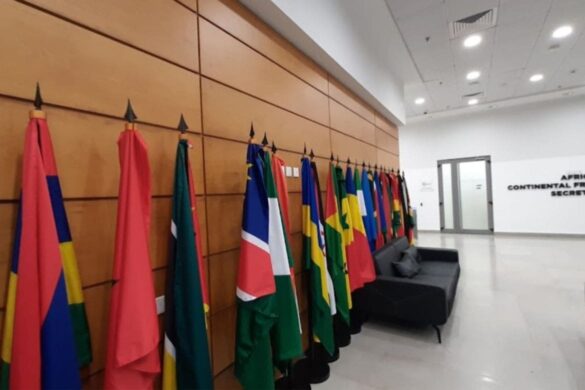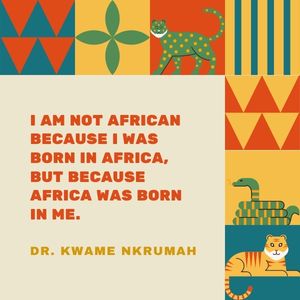Table of Contents
The African Continental Free Trade Area, or for short AfCFTA, is here to stay! In this work, I’ll be discussing the role of Information and Communication Technology in the success of this very entity. I’ll also be delving into how ICT can help streamline processes, improve communication and collaboration between member states, and ultimately contribute to the overall success of AfCFTA. So sit back, relax, and enjoy!
Before you begin, can you comment on the comments area where the African continental free trade area secretariat is?
The role of ICT in the African Continental Free Trade Area
- The role of Information and Communication Technology is critical to the success of the African Continental Free Trade Area (AfCFTA). ICT will play a key role in supporting the smooth functioning of the one African market, by enabling the digital infrastructure and capabilities required for trade facilitation and integration.
- ICT will also help to create an enabling environment for African businesses to take advantage of the opportunities created by the AfCFTA, through supporting online platforms for business-to-business (B2B) and business-to-business (B2C) transactions, as well as cross-border e-commerce.
- In addition, Information and Communication Technology can help to build capacity within African businesses on how to best take advantage of the AfCFTA, by providing access to information and knowledge on trade-related matters, as well as training and skills development programs.




The benefits of ICT to the AfCFTA
It will be an understatement to say that the success of the Free Trade Area hinges on ICT implementation and how effective it’s put into use. ICT can (will) play a significant role in the success of the African Continental Free Trade Area (AfCFTA).
- ICT will help to facilitate trade by providing a platform for online shopping and payments, as well as helping to manage logistics and supply chains.
- In addition, ICT will help to reduce barriers to trade by providing access to market information and facilitating communications between buyers and sellers.
The AfCFTA is a major initiative of the African Union, which aims to create a single continental market for goods and services, with free movement of people and capital. The AfCFTA is currently being implemented and is expected to come into force in July 2019.
The challenges of ICT to the African Continental Free Trade Area
The AfCFTA is currently the world’s largest free trade area in terms of the number of participating countries. However, it faces a number of challenges, one of which is the lack of appropriate and effective Information and Communication Technology infrastructure.
Information and Communication Technology plays a vital role in trade facilitation and in supporting the smooth functioning of free trade areas. In particular, ICT systems are needed to track and manage the movement of goods across borders, process customs declarations, and facilitate cross-border payments. The organization will therefore require a well-developed ICT infrastructure in order to function effectively.
However, many African countries do not have adequate ICT infrastructure in place. This lack of infrastructure is a major obstacle to its effective functioning. In order to overcome this challenge, African countries will need to invest in developing their ICT infrastructure. This investment will be costly, but it’s essential for its success.
The future of ICT in the African Continental Free Trade Area
The role of Information and Communication Technology in the successful implementation of the Continental Free Trade Area has been widely acknowledged.
- ICT will be pivotal in AfCFTA’s success, by reducing trade costs, ensuring borderless trade, and promoting transparency.
- Information and Communication Technologies (ICT) can help to overcome many of the implementation challenges faced.
- ICT can facilitate cross-border trade by reducing documentation requirements, improving transparency, and increasing certainty and predictability in customs procedures.
- ICT can also help to reduce corruption and improve the efficiency of border management procedures.
- The use of ICT can also help to promote intra-African trade by making it easier for African businesses to find & connect with each other, share information and best practices, and jointly develop and access new markets.
- In addition, ICT can help to build the capacity of African SMEs through online training and education programs.
- The Secretariat is currently implementing an e-commerce platform that will serve as a single window for all trade information and transactions. The platform will offer a range of features & services including a business directory, online payments, e-invoicing, shipping & logistics management, among many others.
In order to maximize the benefits of ICT for the Free Trade Area, it’s important that all stakeholders – including governments, businesses, and development partners – work together to develop and implement initiatives that will promote the use of ICT across the continent.
The impact of ICT on the Continental Free Trade Area
The Continental Free Trade Area (AfCFTA), a free trade area that encompasses all 55 Member States of the African Union, and an agreement signed by 44 African countries on 21 March 2018 in Kigali, Rwanda, came into force on 30 May 2019. The Agreement establishing the organization entered into force on 29 July 2019, after ratification by 22 countries.
The aim of the AfCFTA is to create a single continental market for goods and services, with free movement of people and capital, and to boost intra-African trade. In order to achieve this goal, the organization’s agreement provides for the liberalization of trade in goods and services, the establishment of a customs union, and the eventual formation of a single market for Africa.
This means Information Technology will play a crucial role in the success of its success, hence a great impact. This will include, but is not limited to:
- ICT will be used to facilitate trade by improving communication and coordination between the Member States, as well as reducing transaction costs.
- In addition, ICT will be used to create an online portal for the AfCFTA Secretariat, which will serve as a platform for sharing information and best practices related to the implementation of the AfCFTA Agreement.
The use of ICT in the Continental Free Trade Area
The AfCFTA is a free trade area that is hoped to span the entire African continent. It has the potential to boost intra-African trade by removing barriers to trade such as tariffs and non-tariff barriers and making it easier for businesses to export and import goods and services across Africa.
- The use of ICT will play a crucial role in its success, by making it easier for businesses to trade with each other and comply with rules and regulations.
- ICT can help businesses to find new markets for their products and services and to connect with buyers and suppliers from all over Africa.
- ICT can also help businesses to comply with AfCFTA rules on things like origin labeling, which will be important for ensuring that goods can move freely around Africa without being subject to tariffs or other restrictions.
- Furthermore, ICT can help businesses to track their shipments of goods and services, and to manage their inventory levels, so that they can respond quickly to changes in demand from customers in different parts of Africa.
In order for AfCFTA to be successful, it is essential that businesses make use of ICT in order to take full advantage of the opportunities that it offers.
The advantages of ICT in the Continental Free Trade Area
Information Communication Technology should become an essential part of the African Free Trade Area’s negotiations and will play a crucial role in the success of the agreement.
As a key component of Africa’s development strategy, going forward, ICT will be critical in supporting the implementation of the agreement. ICT can help to increase transparency and efficiency in trade operations, reduce costs, and create new opportunities for businesses.
Some of the specific advantages that ICT can bring to the AfCFTA include:
- Improved transparency: ICT can help to improve transparency in trade operations by providing access to information on prices, trade flows, and regulations.
- Reduced costs: ICT can help to reduce the costs of trade operations by automating processes and enabling real-time data sharing.
- Greater efficiency: ICT can help to make trade operations more efficient by streamlining processes and improving communication between businesses and government agencies.
- New opportunities for businesses: ICT can create new opportunities for businesses by providing access to new markets and enabling them to develop innovative products and services.
The limitations of ICT in the African Continental Free Trade Area
While ICT plays a vital role in the successful implementation of the Continental Free Trade Area (AfCFTA), there are a number of limitations that need to be considered.
- One of the key challenges is the lack of standardization across Africa. This means that there is no single ICT platform that can be used to support the AfCFTA. Instead, a number of different systems need to be used, which can make data exchange and collaboration difficult.
- Another challenge is the lack of infrastructure in many parts of Africa. This includes both physical infrastructure, such as roads and power lines, and digital infrastructure, such as broadband internet access. This limits the ability of African businesses to take advantage of digital technologies, and it also makes it more difficult for government agencies to implement AfCFTA-related ICT projects.
- Finally, there is a lack of skilled personnel in many African countries. This includes people with the requisite technical skills to design, develop and maintain ICT systems, as well as people with the business skills to understand how these systems can be used to support trade and economic development. This shortage of skills limits the ability of African businesses and governments to make full use of ICT in their operations.
Conclusion
It’s a good move that the Free Trade Area has been established. For effective management of this outfit as well as the enjoyment of the numerous benefits this organization brings, the role that Information and Communication Technology brings makes it a win-win situation for Africa and its people.



